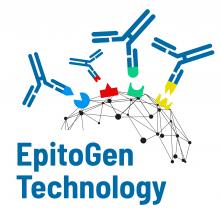EpitoGen COVID-19 ELISA Tests
The new EpitoGen Technology from Vertebrate Antibodies Ltd provides a novel platform for improved antibody tests. Using this platform, several unique, highly sensitive COVID-19 ELISA tests have been developed.
At the population level, the humoral response to SARS-CoV-2 is heterogenous. As such, the traditional antibody assay using eithe r the spike or nucleocaspid as antigens are less sensitive. Additionally, the accumulation of SARS-CoV-2 mutations will further reduce the performance of existing assays. To overcome this challenge, EpitoGen Technology, has been developed to produce a set of unique, highly sensitive COVID-19 ELISA tests.
EpitoGen COVID-19 ELISA Tests are the only epitope-based ELISA tests and the only tests to utilize 5 viral COVID-19 antigens and include prevalent mutations.
These assays detect a population level spectrum of COVID-19 IgG antibodies specific to the spike, nucleocapsid and other COVID-19 viral proteins. The epitopes selected are IgM and IgA rich, making the assays suitable for the detection of IgA and IgM antibody responses. The high sensitivity of the assays makes them ideal for the study of immune response to both natural infection and vaccination for COVID-19.
Several tests are available, each with specific functions:
- EpitoGen Universal - Detection of antibody response to 15 epitopes from five COVID-19 viral proteins including corresponding mutants (79 prevalent mutations)
- EpitoGen Differential – Differentiation of antibody response to vaccination-induced and infection-induced protection
- EpitoGen Immunity – Evaluation of antibody response following vaccination or natural infection and antibody response against the original and mutant COVID-19
- EpitoGen Spike Mutant - Detection of antibodies specific to variant forms of COVID-19 spike protein
These tests provide reliable data that is critical to ongoing designs of diagnostics and vaccines, particularly with respect to emerging variant forms of COVID-19.
The EpitoGen platform can also be used for diagnostics development for infectious and autoimmune diseases such as Lyme Disease and Type 1 Diabetes. These developments are currently underway with the team at Vertebrate Antibodies Limited.
- New COVID test more than 99 percent accurate (University of Aberdeen, 12/10/21)
- Antibody Testing as a Tool of Pandemic Management (Tony Blair Institute for Global Change, 7/22/21)
- Scientists develop 'game-changing' antibody test (University of Aberdeen, 6/15/21)
- Helping Fight The COVID-19 Pandemic with Artificial Intelligence (United Nations Academic Impact, 06/14/2022)

